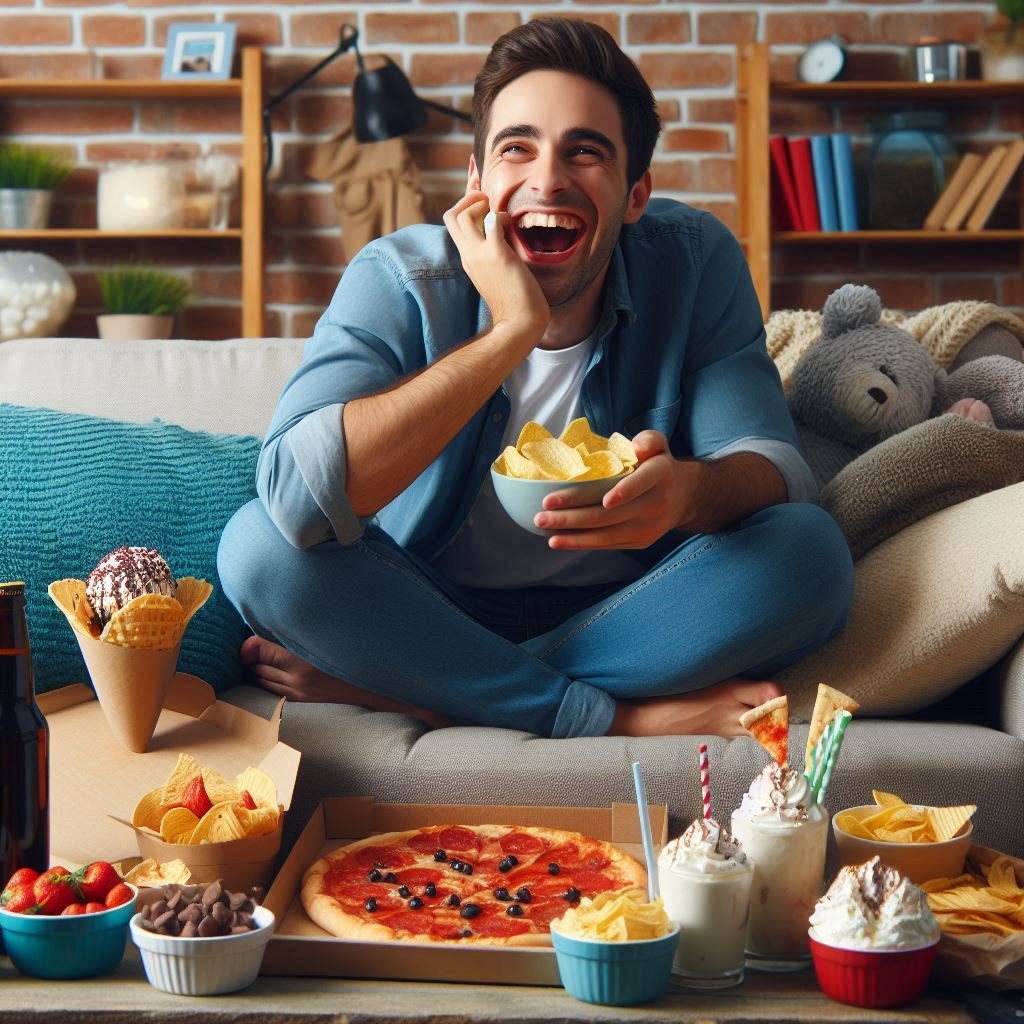A guilty pleasure is something that a person enjoys despite knowing that it is not generally held in high regard or may not be good for them. It is often associated with feelings of guilt or embarrassment because the activity or is seen as unhealthy, or culturally low. Even though, the person continues to enjoy it because it brings them pleasure and satisfaction.
Characteristics
Guilty pleasures frequently contrast with a person’s typical appearance. For example, someone who takes pride in their creative preferences may secretly enjoy reading celebrity gossip publications.
Guilty pleasures often provide an escape from daily stress, responsibilities, or serious matters. They offer a break from routine and allow for a bit of indulgence in something purely enjoyable.
Guilty Pleasure Examples
In this article you will find the most common guilty pleasure examples that you can relate
- Binge-watching TV shows or movies
- Eating junk food
- Reality TV
- Online shopping sprees
- Procrastinating
- Social media scrolling
- Sleeping in
- Cheesy romance novels or movies
- Playing video games
- Listening to ‘bad’ music
- Eating straight from the container
- Skipping workouts
- Celebrity gossip
- Indulging in luxury items
- Fantasy sports
Binge-watching TV shows or movies:
This means watching many episodes of a TV series or several movies in one sitting. It’s fun and relaxing but can take up a lot of time.
Eating junk food
Enjoying fast food, sweets, or salty snacks like chips. They taste great but aren’t very healthy, so people might feel a bit guilty after eating them.
· Reality TV
Watching shows like “The Bachelor” or “Keeping Up with the Kardashians.” These shows are entertaining but often considered low-quality by critics.
· Online shopping sprees
Buying many items online, sometimes things you don’t need. It’s exciting but can be expensive and lead to regret later.
· Procrastinating
Delaying tasks you need to do, like homework or chores, to do something more enjoyable. It feels good at the moment but can cause stress later.
· Social media scrolling
Spending a lot of time looking at posts on Instagram, Facebook, or TikTok. It can be fun but is often a big time-waster.
· Sleeping in
Staying in bed longer than usual, especially on weekends. It’s cozy and relaxing but can make you feel lazy if done too often.
· Cheesy romance novels or movies
Reading books or watching movies with simple, predictable love stories. They are enjoyable but sometimes considered silly or unrealistic.
· Playing video games
Spending hours playing video games, sometimes ignoring other responsibilities. It’s entertaining but can be addictive.
· Listening to ‘bad’ music
Enjoying catchy songs that critics might think are not very good. The music makes you happy, even if it’s not considered high-quality.
· Eating straight from the container
Enjoying foods like ice cream or chips directly from the package instead of using a bowl. It’s convenient but might seem a bit lazy.
· Skipping workouts
Deciding to rest instead of exercising. It feels nice to relax, but skipping too many workouts can affect your health.
· Celebrity gossip
Keeping up with news about celebrities and their personal lives. It’s interesting but often seen as unimportant or trivial.
· Indulging in luxury items
Buying expensive things like designer clothes or gourmet food. It feels special but can be very costly.
· Fantasy sports
Spending a lot of time managing a fantasy football or other fantasy sports team. It’s a fun hobby but can become very time-consuming.
· Psychological Aspects
Engaging in guilty pleasures can create cognitive dissonance, where there is a conflict between one’s actions and beliefs or values. The enjoyment conflicts with the guilt or societal judgment.
Guilty pleasures can offer temporary relief from stress or dissatisfaction, providing a quick and easy way to boost one’s mood.
What constitutes a guilty pleasure can vary widely across cultures and societies, as different activities and indulgences are viewed differently around the world.

Frequently Asked Questions (FAQs)
What is a guilty pleasure?
A guilty pleasure is something that a person enjoys even though it may be considered unadvisable, inappropriate upon by societal standards. This enjoyment is often accompanied by feelings of guilt or embarrassment because it contradicts one’s usual tastes, values, or public personal.
Why do people have guilty pleasures?
People have guilty pleasures because these activities bring them pleasure, satisfaction, or a sense of escapism. They offer a break from routine and stress, providing a quick and easy way to boost one’s mood, even if it comes with some guilt or societal judgment.
Are guilty pleasures harmful?
Guilty pleasures can be harmless if enjoyed in moderation. However, if indulged in excessively, they can lead to negative consequences, such as unhealthy habits, procrastination, or financial strain. It’s important to find a balance and not let guilty pleasures interfere with one’s overall well-being.
Can guilty pleasures be good for mental health?
In moderation, guilty pleasures can be good for mental health by providing relaxation and a temporary escape from stress. They can help improve mood and offer a sense of enjoyment. However, if they lead to excessive guilt or interfere with daily responsibilities, they may have a negative impact.
How can I manage my guilty pleasures?
To manage guilty pleasures, set limits on how often and how long you indulge in them. Be mindful of the potential consequences and try to balance them with healthier activities. Reflect on why you feel guilty and whether it’s necessary to feel that way. Sometimes, accepting your guilty pleasures as part of your personality can reduce the associated guilt.




